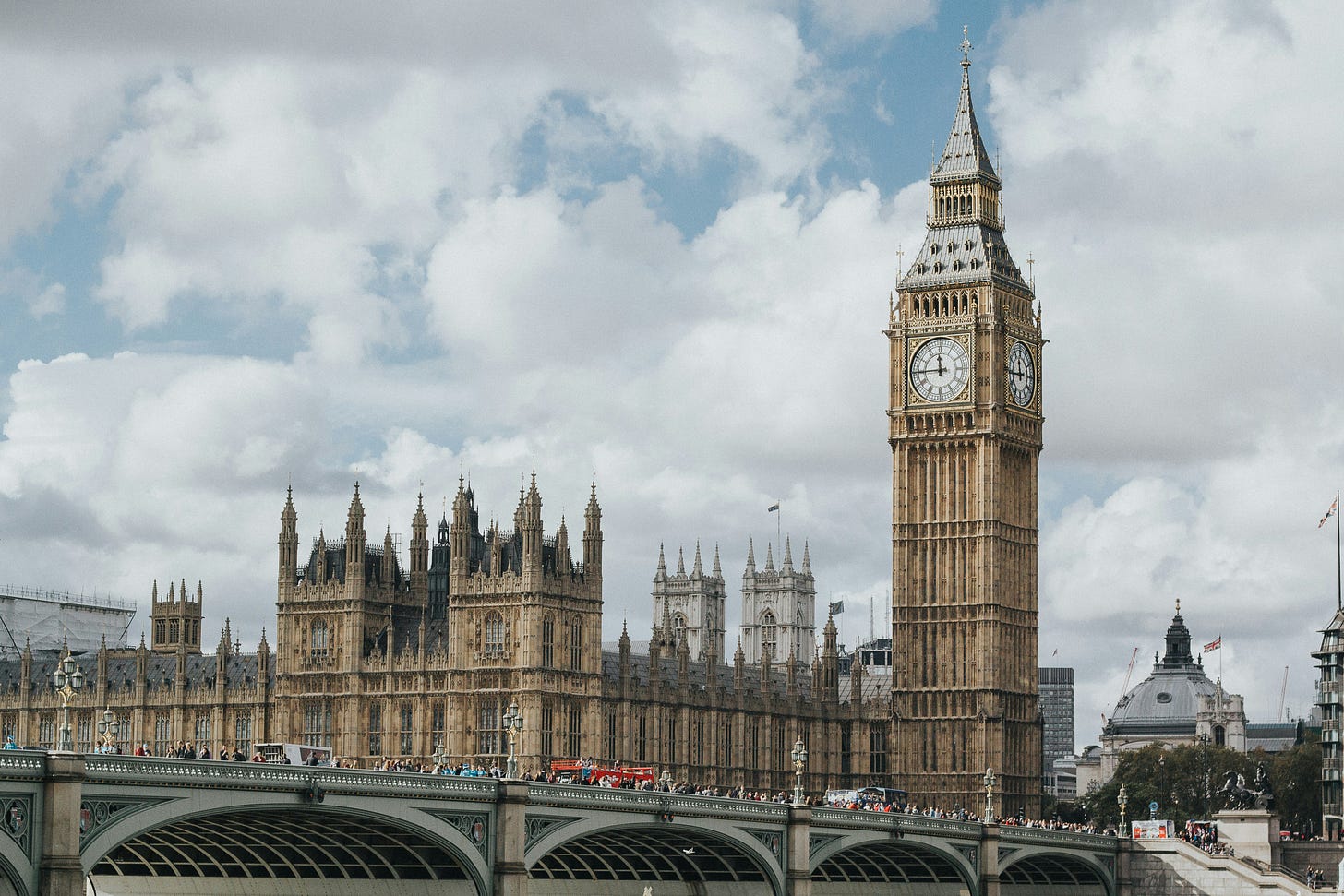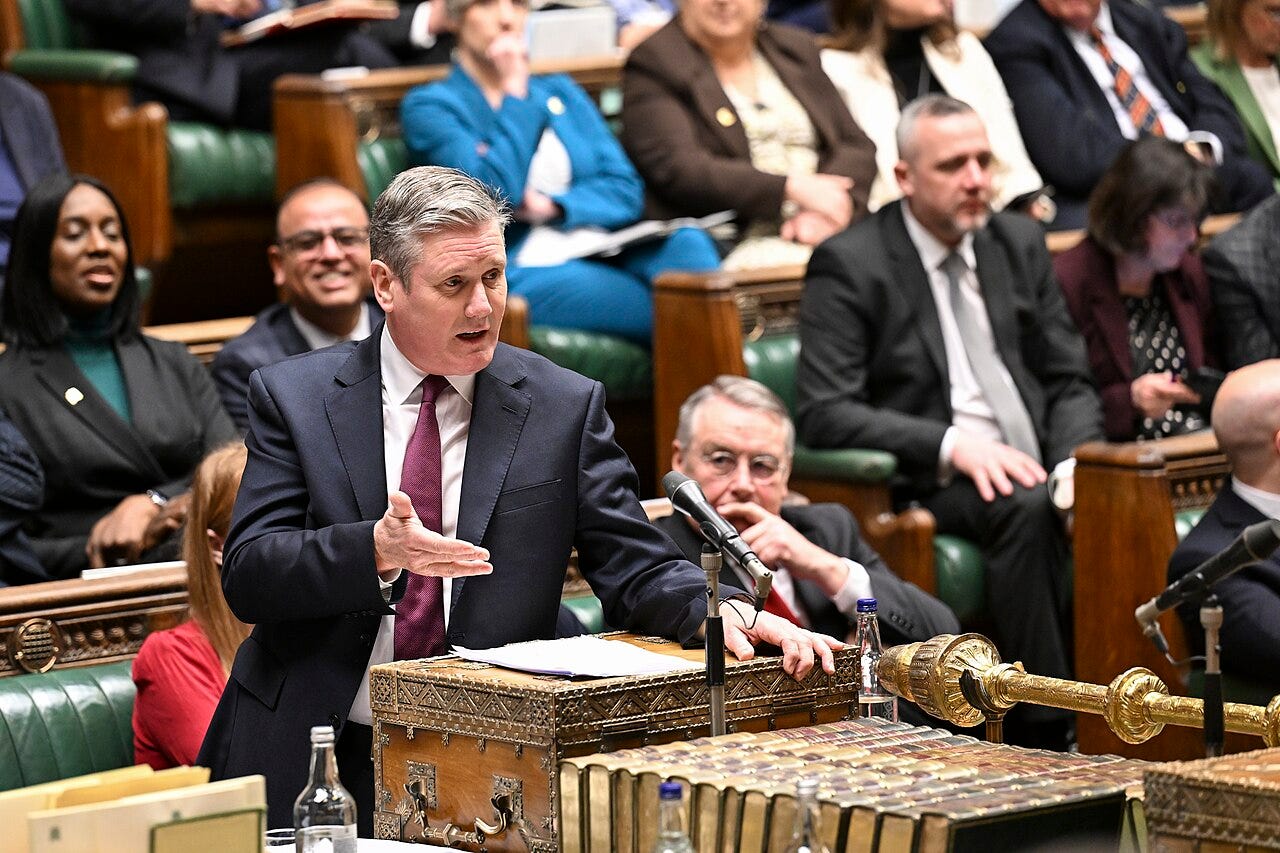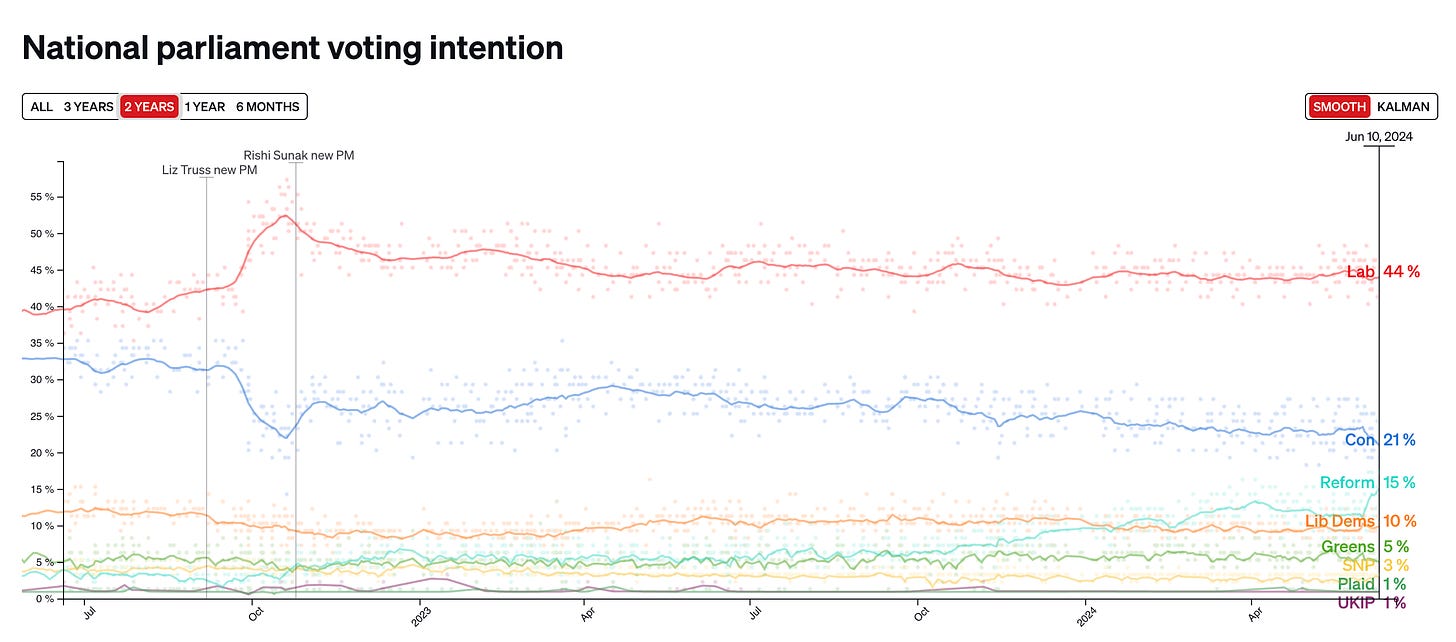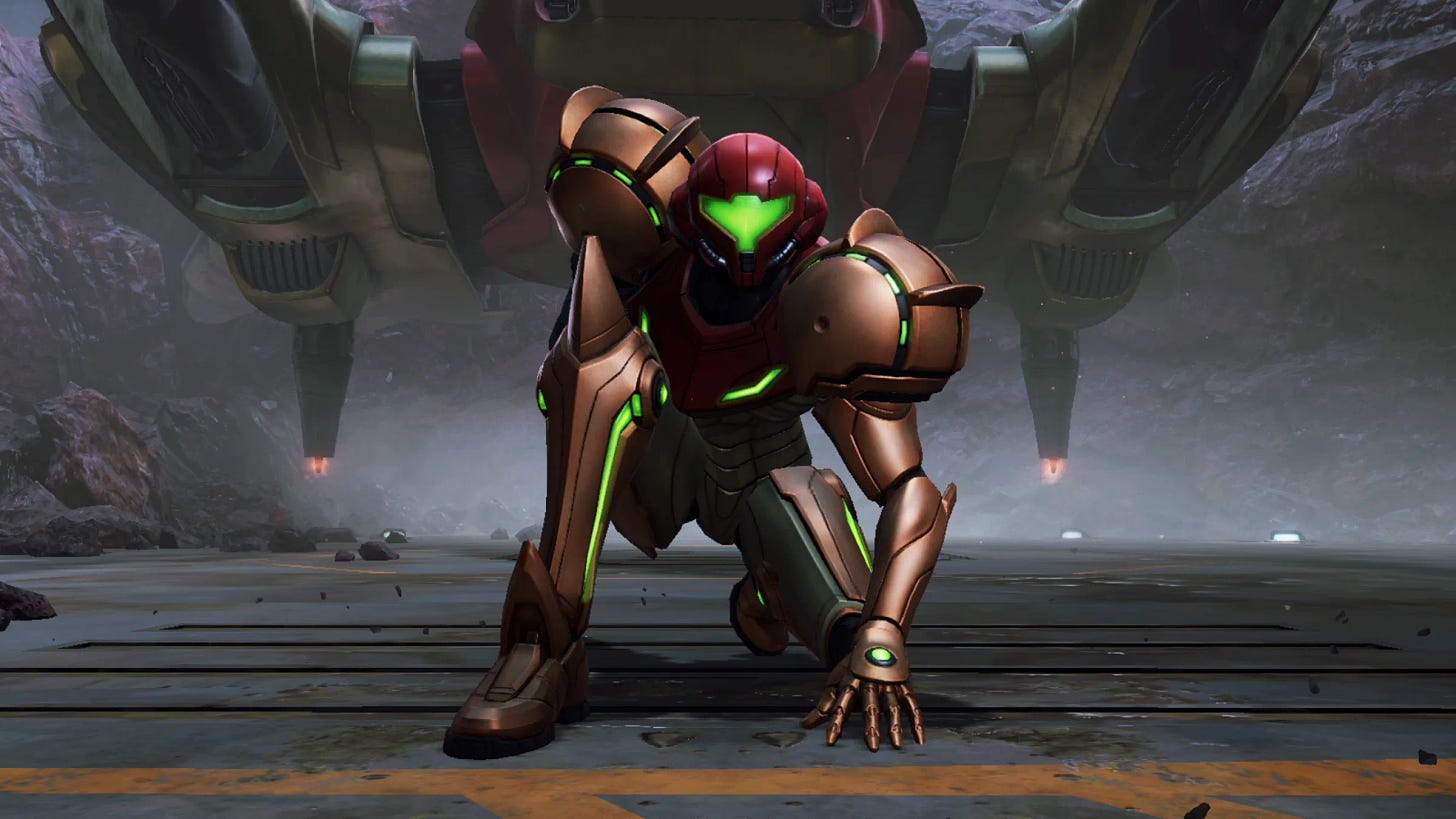The VGIM General Election Cheat Sheet, 20/06/2024
Video games and politics in the same place? Quick, somebody tell Reddit!
I explore the UK election through a games industry lens
Metroid Prime leads a surprisingly strong Nintendo Direct selection
Elden Ring: Shadow of the Erdtree brings darkness in time for the Summer solstice
Howdy VGIM-ers,
I have some bad news and some good news for you.
The bad news is that all the tickets for the VGIM Business Breakfast on Wednesday 10th July, sponsored by Big Games Machine, were snapped up earlier this week.
The good news? I opened up another 25 free spaces for you all to take advantage of. Make sure to hit the button below to join us in Brighton for cuppas, pastries and a chat about the future of the video games media.
And in further excellent news, I’m off on holiday on Friday to spend a week in San Sebastian picking up pintxos, relishing Rioja and flipping my way through Children of Dune by the pool (each to their own, eh?)
Usual VGIM service will be pretty much undisrupted. Next week’s newsletter is already written but will be a touch shorter to give me a week off from compiling the news and job moves. VGIM Insiders will also still receive their first edition of The Debrief next Friday in return for their ongoing support.
If you’ve been enjoying VGIM and would like to put some cash behind my hotel bar, use the code KEENBEAN to buy an annual Insider subscription for just £40 or sponsor an edition of the newsletter here.
And if your business needs a hand understanding the games market, building its strategy to get into games or wants to effectively communicate and connect with Big Names in The Biz, email george@half-space.consulting and we can talk shop post holiday.
Enough of all that though: it’s time to get political.
The big read - The VGIM General Election Cheat Sheet
It’s nearly General Election time. Two weeks today, voters from across the UK will head to the polls in a national election for the first time since 2019 to decide whether to give Rishi Sunak, the ‘gamer’ Prime Minister, another five years in office or to pass power to Sir Keir Starmer’s Labour Party.
Understandably, the vast majority of people who head to the polls will be thinking about how their vote will affect our National Health Service, how much tax they pay and whether or not we want to have any functioning infrastructure in the country anymore.
But despite what 14 year olds on the internet say, a general election will also, inevitably, have an impact on the video games industry.
While most of that will be felt in the UK - obviously enough - policy debates in the country have either influenced regulators elsewhere (e.g. our many years of trench warfare with Government over loot box rules) or actively shaped how other places make their rules (howdy to you, the California Age Appropriate Design Code). This means it is well worth keeping an eye on the UK elections irrespective of whether you hail from these shores.
So in the spirit of being useful, I’ve produced this handy VGIM election cheat sheet to enable you to quickly understand the state of political play, how the party’s pledges could help (or hinder) the sector and provide a tip on who to support on polling day.
Total Annihilation?
We might be two weeks away from polling day but the consensus around the 2024 election is clear: voters in the UK are, almost certainly, about to change government in resounding fashion.
For the past two years, the Conservative Party has been hovering somewhere between 12-20% behind The Labour Party in the opinion polls in no small part due to Liz Truss vandalising the economy.
The Conservatives strategy had been to cling on to power for as long as possible in the hope that the economy would turn the corner to bring voters back to them. So it was something of a surprise when Prime Minister Rishi Sunak called an election for Thursday 4th July, despite the economic picture remaining decidedly mixed for most voters across the country.
Since then, things haven’t gone well for the beleaguered PM. His chances of winning were always slim given how long the party had been in power and the myriad cock ups of his predecessors. But the party’s bad situation has turned into a full blown nightmare, with a series of self-inflicted gaffes - such as the PM leaving the D-Day 80th anniversary commemoration early to do a TV interview - and the full throated entrance of Nigel Farage’s Reform party into the electoral fray putting the Tories at risk of slipping into third in terms of the national vote share.
As a result of this meltdown, Sir Keir Starmer’s Labour Party looks to be on course to win the election in comprehensive fashion.
Despite concerns from some that the party’s “change” message is remarkably cautious and uninspiring, Labour’s pledge to end years of political chaos, offer stability to the country and provide competence in office has put it on course to win the election with a potentially massive parliamentary majority - essentially handing it freedom to act how it chooses for five years.
However, there are reasons to remain cautious until the votes are counted. Labour’s lead is big enough that the party is concerned about complacency on polling day, especially with smaller parties such as The Greens, The Liberal Democrats and Reform picking up votes from people who feel there is little to fear from a battered Tory party. Pollsters have also historically underestimated the size of the Conservative vote in the UK before, as they did in the 2015 election, meaning there is a small chance that the situation is simply bad for the party rather than disastrous.
But if you think you’re hearing the sound of me clutching in the general direction of straws, you’d be right. Barring something extraordinary, the Conservatives will be out of office in a couple of weeks time and Labour will be comfortably in power for at least the next five years.
The name of the game
The result of this election looks to be a foregone conclusion. But it is still worth investigating what the Conservative and Labour Party manifestos - essentially their programmes for governing the country - offer the industry to get a sense of whether or not they’re good news for the business.
Unsurprisingly, the video games sector is not a big talking point in either party’s manifesto.
The sector may have grown rapidly, now contributing the best part of £7bn to the national economy each year according to figures from Ukie. But the fortunes of the UK games industry is small potatoes to the average voter, which means it’d be unusual for a political party to expend too much energy - or political capital - on it within an election campaign.
However, we can still see some direct and indirect signs from each party’s manifesto about how they’re likely to treat the industry.
On the direct front, the sector does receive a name check in both of the major party’s programmes for power for the first time since 2017.
The Conservative manifesto references the sector in regards to its proposal to create a new ‘flexible coordination service’ for helping young talent into the creative industries, while Labour’s document refers to games alongside its wider plan to support and grow the creative sector that it announced earlier this year.
Ultimately, this is good news for games. Whichever party enters power, we can reasonably expect that either administration would at least have some appreciation for the sector and would be willing to talk shop with us.
And while there are no specific policies favouring the industry, there are no challenging ones either. The Tory party’s promise to investigate loot boxes in its December 2019 manifesto caused the UK sector a lot of headaches over the past half decade, so it is a relief to see nothing similar to this in either manifesto.
Terms of service
So both parties are therefore pretty evenly matched when it comes to their direct acknowledgement of the industry.
This means that voters looking to back video games businesses will need to take a closer look at the ways each party may, or may not, indirectly support the sector’s agenda through its wider policy programme.
While video games touches a surprisingly large amount of the political world, there are five policy areas close to the industry’s heart that can be used as a vibe check to examine a party’s manifesto: their views on the creative industries generally; their plans to help businesses access finance and investment; their plans for domestic skills and education; their approach to immigration policy; their wider positions on tech policy.
And after looking at each of the manifestos to assess them against these five areas, it’s clear that Labour is much more closely aligned with the games industry than the Conservatives are in this election.
Many of you won’t find that at all surprising given the fact that the games industry is, for the most part, a left-leaning or liberal profession.
However, the Tories actually played quite an important part in supporting the sector’s growth. Between 2010 and 2016, it introduced policies such as Video Games Tax Relief and the UK Games Fund which proved to be major pillars of the industry’s growth.
But the Tories never fully clocked that their support for the industry was a potential blueprint for how they could grow the wider economy (or for their oft talked about levelling up agenda when Boris Johnson was Prime Minister).
And after the madness of the Brexit referendum, the party drifted steadily further and further away from the industry’s position on most of the areas it cares about.
This divergence from the sector’s priorities can be seen in their manifesto for the 2024 election.
There are hints, in places, that the Tories remember what kind of support the sector needs. Its explicit commitment to ensuring creative industry tax incentives remain competitive is positive and providing a further £1.6bn investment into the national Digital Catapult network by 2028 would support some games companies distributed across the UK.
Outside of funding though, its programme feels almost directly at odds with what the sector needs to succeed.
Its proposals to restrict immigration by raising the salary threshold for a Skilled Worker visa to £38,700 would be deeply inconvenient and costly for games companies, locking talent out of the country.
Its public framing of certain creative degrees as “Mickey Mouse” qualifications that are not worth the money risks damaging a key part of the industry’s talent pipeline.
And on tech policy, its pledge to ban mobile phones during the school day may be popular but it aligns the party to Jonathan Haidt style thinking around online safety - something that would make the sector understandably nervous about its long term agenda.
In comparison, Labour’s manifesto offers the industry much more of what it needs across pretty much all of its key policy areas.
Its commitment to establish a body called Skills England to train talent across the country in conjunction with industry is a sensible move that games companies can get behind.
Labour’s plan to link that body to immigration policy to identify areas of genuine shortages raises hopes that games industry job roles might, again, find its way onto the Shortage Occupation List, which could open up the industry to global talent again in contrast to the Conservatives approach.
Labour’s decision to marry an internationalist approach to trade with a greater focus on selling the regional strengths of the UK also plays well with the sector, which has built globally successful businesses that contribute effectively to local economies ranging from Brighton to Teesside.
And Labour’s promise to integrate its creative plan into the manifesto means it already understands the importance of building games specific policies into its future offer - giving the industry a better base to lobby from in the future.
The manifesto isn’t perfect, of course. It is cautious at times, which means that changes in areas like immigration policy will likely prove to be helpful tweaks around the edges instead of a wider opening up. Its tech policy agenda could also tighten the regulatory environment around games, including through plans to regulate aspects of artificial intelligence that intersect with the sector.
Yet these are minor quibbles. If we’re looking at what the two biggest parties are selling, Labour has much more of what the industry wants to offer - putting them in pole position to receive industry support.
Elect your player
So, who should you vote for in the election? The answer isn’t quite as straightforward as you’d perhaps expect.
The UK’s political system, which elects Members of Parliament to represent single constituencies in a first-past-the-post fight, regularly forces people to vote for parties they may not usually support to prevent another party getting in. And I’d add here that it would be a bit weird to vote for a party solely on the basis of their video games policy, so do, y’know, check their wider policy agenda and research who your local candidates are before you draw your cross in a box.
But if you’re wondering which of the two main parties the industry will be hoping emerges victorious in two weeks time, it is Labour.
The party’s programme for government is much more closely aligned with what the games business needs on a practical and philosophical level.
And while it will have plenty on its plate were it to come to power in July, a Keir Starmer led administration looks like it’ll be a better bet for the long term future of the sector than anything the Conservatives can currently offer.
Sorry Rishi *shrugs*.
Video game constituencies - three battles worth watching
Warwick and Leamington - Labour MP and video games enthusiast Matt Western is defending a tiny majority of 789 against Conservative rival James Uffindell in a seat that covers a big games cluster that’s nicknamed the ‘Silicon Spa’. In normal circumstances, this should be a close fight. Instead, the scale of the Labour win here will likely indicate whether the party is on course to win the election or whether it is in landslide victory territory.
Guildford - Conservative MP Angela Richardson is defending her hold over the town dubbed ‘The Hollywood of Video Games’ from Liberal Democrat Zoe Franklin. Richardson has a majority of 3,177, making it a marginal constituency and one of the Lib Dems target seats - giving the large games industry workforce there enough electoral power to tip the balance.
Bristol Central - Thangam Debonnaire, Labour’s Shadow Culture Secretary and penner of its creative industries strategy, should be rock solid favourite to take the new seat of Bristol Central given her hefty majority in the former seat of Bristol West. But left-wing discontent with Labour and an incredibly strong Green presence in local politics has made it a target seat for Carla Denyer, the party’s co-leader - turning another constituency with plenty of games businesses into a battleground.
The bluffer’s guide to the general election
Do say: The 2024 General Election is a challenging one for all parties due to the parlous state of the public finances but it offers voters the chance of a meaningful change after years of economic uncertainty.
Don’t say:…so we’re all voting for Count Binface, right?
News in brief
Primed and (nearly) ready: Nintendo announced a March 2025 release date for Metroid Prime 4 on Switch in a surprisingly punchy Direct event on Tuesday. The event also included the announcement of the first ever Legend of Zelda game where you actually play as Zelda and a new entry in the Mario & Luigi series.
Falling to Pieces: Pieces Interactive, the team behind the Jodie Comer and David Harbour powered Alone in the Dark remake, has been shuttered by Embracer Group. The company will close its doors after 17 years in business, joining the likes of Free Radical Design and Volition as victims of Embracer’s painful corporate restructure.
Sowing Discord: Players will be able to access Discord voice chat via PS5 across the world, according to PlayStation. This is fascinating for two reasons. First, it suggests PlayStation is willing to cannibalise its voice service - a smart hedge if you think moderating online chat could become a pain in light of a load of new online safety laws rolling out. It also comes shortly after Nintendo ditched X integration in a Switch update, confirming Discord as the social media platform of choice for players.
EQTime not like the present: EQT Group’s deadline for snapping up Keywords Studio has been extended to 28th June, according to reports in GI Biz. The private equity group were initially meant to have either made a formal offer for the business or withdrawn from the purchase by 5pm on 15th June, but it’s been kicked back by two weeks to give everyone the opportunity to dot is and cross ts.
Japan-easy: Fortnite and the Epic Games store will be heading to Japan in 2025 following the passage of the Act on Promotion of Competition for Specified Smartphone Software, which stops designated platforms from blocking third party stores, payment options or egregiously favouring their own stuff. Failure to comply with the new rules will see the app stores risk fines of 20% of domestic revenue, rising to 30% for repeat infractions.
On the move
Max Stuart is now the HR and Talent Acquisition Manager at Bandai Namco…Eric Alayoubi has become 2K’s Senior Director, Integrated Marketing Strategy…More job moving at Netflix with Tracey Watson stepping up to become its Senior Manager, Content Design…Daniel Duranka is in as CEO at Pixel Federation…And John Hight has left his position as General Manager at Blizzard after a decade in the business…
Jobs ahoy!
Want to be a Gameplay Designer working on EA Sports FC? Electronic Arts is hiring now…There’s an Associate Director gig going on the Xbox account over at Assembly…Zynga is recruiting for a Product Manager to work in the Gram Games team…LEGO is snapping up a Senior Internal Communications Manager…And if you enjoy a challenge, why not become the Vendor Manager, Trust and Safety for Epic Games and its dizzying array of partners?...
Events and conferences
MCV/Develop Awards, London - Tonight
Games for Change Festival, New York - 27th-28th June
Develop: Brighton, erm…Brighton - 9th-11th July
VGIM Business Breakfast, Brighton - 10th July
ChinaJoy, Shanghai - 26th-29th July
Games of the week
Elden Ring: Shadow of the Erdtree - Wave goodbye to a decent chunk of your friends as Elden Ring’s first DLC pack finally lands.
Still Wakes the Deep - The Chinese Room’s latest walking sim asks what happens when you combine Eldritch horror with Scottish accents.
Dystopika - I don’t want to say my readers are predictable but I am willing to bet that two of you will text me to ask more about this “cyberpunk city builder” before the end of today.
Before you go…
Helldivers 2 players were given an interesting choice in a recent major order: save a bunch of children trapped at a virtual hospital for no in-game reward or complete an alternative objective to unlock a new in-game stratagem.
The players chose to save the kids. And as a result of their selfless act, developers Arrowhead Interactive made a donation to Save the Children that was equivalent to one dollar per virtual kiddo saved.
No, you’re crying…








